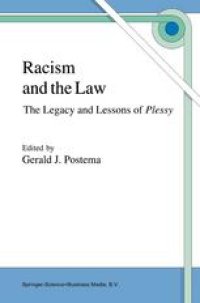
Ebook: Racism and the Law: The Legacy and Lessons of Plessy
- Tags: Theories of Law Philosophy of Law Legal History, Philosophy of Law, Constitutional Law, Public International Law, Ethics
- Year: 1997
- Publisher: Springer Netherlands
- Edition: 1
- Language: English
- pdf
Plessy v Ferguson (1897) established racial segregation in American constitutional law for over fifty years and its moral and political legacy lives on, despite attempts in the United States to counter its devastating effects during the last half century. Ironically, in the current debate over affirmative action, Justice Harlan's eloquent dissent has been used to justify attacks on government affirmative action programs. In this book, five distinguished philosophers and constitutional theorists, working from very different theoretical positions, take a fresh critical look at the moral and political principles underlying this historic decision and Harlan's dissent. They also explore the nature and extent of law's complicity in perpetuating Plessy's racialist aims. Emerging from their varied but complementary analyses is a deeper and more nuanced understanding of the social injustice of racial segregation in its historic and contemporary forms and of resources of the law to reverse it.
Plessy v Ferguson (1897) established racial segregation in American constitutional law for over fifty years and its moral and political legacy lives on, despite attempts in the United States to counter its devastating effects during the last half century. Ironically, in the current debate over affirmative action, Justice Harlan's eloquent dissent has been used to justify attacks on government affirmative action programs. In this book, five distinguished philosophers and constitutional theorists, working from very different theoretical positions, take a fresh critical look at the moral and political principles underlying this historic decision and Harlan's dissent. They also explore the nature and extent of law's complicity in perpetuating Plessy's racialist aims. Emerging from their varied but complementary analyses is a deeper and more nuanced understanding of the social injustice of racial segregation in its historic and contemporary forms and of resources of the law to reverse it.